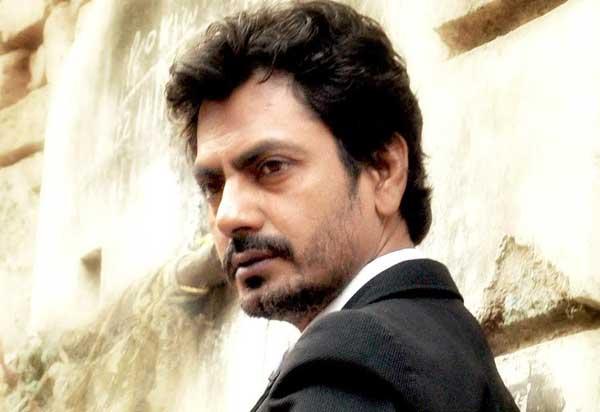 image
image
Awards do not mean good roles: Nawazuddin Siddiqui
Nawazuddin Siddiqui is one of the most acclaimed actors among the current crop today who does not mind experimenting with characterisations. While his award winning Haraamkhor has been released recently after a long hiatus besides Shahrukh Khans Raees where he plays a police officer, the actor himself is not happy with the state of things. Shoma A. Chatterji finds
If the police officer in Kahaani is an example, or, the small time television stringer in Bajrangi Bhaijaan is another one, then one must concede that Nawazuddin Siddiqui is a show stealer and not just a scene stealer. Take his cameo role of a pimp in Talaash. Or, in Gangs of Wasseypur 2. More recently, one has seen his performance inHaraamkhor while being highly praised for his performance in Shahrukh Khan’s release-of-the-year Raees. He has worked with the top directors in Indian cinema including the lead in Buddhadeb Dasgupta’s Anwar Ka Ajab Kissa.Success has come lately but Siddiqui sounds despondent.
Excerpts of an interview:
We hear you have stopped attending award functions. Why?
What is the whole point of these awards, I’d like to know. In fact, I have told most of these award organisers to keep me out of any short-list now and in future. At the end of it, the actor who will pick the trophy will get it for a performance he himself feels he has not done justice to. Kahaani happened after 12 long years of struggle. You will miss me if you blink in Sarfarosh (1999), The Bypass (2003) and Munnabhai MBBS (2003).
Your career is gong great guns. Why do you sound so unhappy?
The kind of films an actor who loves to do are not happening. For example, I just took a token fee of rupee one for my work in Haraamkhor because for this kind of films, money is not important. The actor in me wants to remain alive with films like this and the director made it meaningful for me in terms of the story, the treatment and the characterisation. It has done the rounds of festivals and fetched me a prestigious award at an international festival. But the Indian audience is getting to watch the film after four long years. It makes any actor feel sad, doesn’t it?
What about Buddhadeb Dasgupta’s Hindi film Anwar Ka Ajab Kissa? Wasn’t the film a game-changer for you?
I was convinced that this film would truly take me places and I would gain from it as an actor and a creative artiste. But it didn’t because though it was screened in many festivals, it has never been released in India. I wanted to work with Dasgupta from the time I saw his film Tahader Katha. It was visually stunning.
I heard that he was returning to Hindi cinema for the first time after he had made Andhi Gali many years ago. It was a great learning experience with some scary situations. We shot along the beautiful hill resort in Jamui district notorious for Maoists; we were shooting under threat of an attack that could have happened any minute. We had to wrap up and quickly leave before the schedule got over as there was a bandh call from the Maoists the following day. No one in the area dares to defy closure orders from the Maoists.
Don’t you like to work in mainstream films?
.jpg) Of course, I do. It’s very important for our bread and butter.It’s also a great learning experience. But it fails to satisfy the actor in me because most directors work within the given gheesa-peeta formula putting in six songs, two fights ending with the happily-ever-after union of the hero and heroine. When Anurag Kashyap, Sujoy Ghosh and other directors tried to change this cliché in Hindi cinema, I was perhaps the happiest actor around. We believed that if a film was lauded at film festivals, it would do commercially well too. But that didn’t happen. We really can’t place a finger on the pulse of the audience and this is what depresses me a lot. Films that do well abroad fail even to get a release in India.
Of course, I do. It’s very important for our bread and butter.It’s also a great learning experience. But it fails to satisfy the actor in me because most directors work within the given gheesa-peeta formula putting in six songs, two fights ending with the happily-ever-after union of the hero and heroine. When Anurag Kashyap, Sujoy Ghosh and other directors tried to change this cliché in Hindi cinema, I was perhaps the happiest actor around. We believed that if a film was lauded at film festivals, it would do commercially well too. But that didn’t happen. We really can’t place a finger on the pulse of the audience and this is what depresses me a lot. Films that do well abroad fail even to get a release in India.
But Shahrukh Khan has gone on record saying that your performance as a strict police officer in Raees is your career best. Doesn’t that lift your spirits?
Yes, of course it does. It has brought back that small ray of hope. Working with him is great fun on the one hand, and learning a lot on the other. Both of us are crazy about good work and about putting in the best we can. Shahrukh is a great star but when he comes to the sets, he becomes as ordinary as you and I. He never allows that starry halo to intrude into his work, and into those he works with.
You have done the main lead in eight films over the past six years. Doesn’t that give you reason to be happy?
I was happy in the beginning. But not one of these eight films has been released yet. I don’t have the faintest clue about whether they will ever release or not. This has chipped away that happy feeling. At the same time, I feel thrilled when I get to work in this kind of films. Popular films keep your kitchen fires running. But these films fulfil the hunger of the artiste within you.
How does the actor in you feel when a film of yours flops or does not release at all?
I look upon them as experiences to learn from. If an actor keeps brooding about a film that didn’t work or didn’t even get a release, he might destroy himself as a creative artiste. You can’t imagine how much I have learnt while working on Dasgupta’s film. And after that, I have done better work in many other films. Success of a film at the box office doesn’t necessarily make an actor. He learns from every film he works in.
We hear you took dancing lessons for a film too?
(Laughs) Yes, that’s right. I was worried because I can’t dance at all and have two left feet where dancing is concerned. Nor did dance interest me in any way. But when I told myself that this was specifically for my role inMunna Michael, I told myself – why not?
Top Headlines
-
Entertainment
Bollywood 2025: Hits, Hype and Heartbreaks as Dhurandhar Redefines the Year
December 24, 2025
-
Entertainment
Rotary Club of Calcutta East Central celebrates centenary of iconic actor Santosh Dutta with statue unveiling
December 04, 2025
-
Entertainment
Valentyn Vasyanovychs To The Victory! wins 2025 TIFF Platform Award unanimously
September 26, 2025
-
Entertainment
Chlo Zhaos Hamnet Wins TIFF 2025 Peoples Choice Award
September 20, 2025
-
Entertainment
Sholay: Golden even after fifty years
July 04, 2025
-
Entertainment
War 2: Check out Hrithik Roshan, Jr NTR and Kiara Advani's new posters
June 26, 2025
-
Entertainment
LGBTQIA+: Icelandic film Odd Fish and Brazil's Baby win big at KASHISH 2025 film festival
June 12, 2025
-
Entertainment
Katrina Kaif named Maldives tourism global brand ambassador ahead of Modi's visit
June 10, 2025
-
Entertainment
'Queen marches to conquer': Deepika Padukone joins Atlee's AA22xA6 starring Allu Arjun after 'Spirit' exit
June 08, 2025
-
Entertainment
Dakota Johnson and Chris Martin, who were in on-and-off relationship, broke up: Reports
June 06, 2025


